'Make football industry more inclusive' says Fifa's Samoura
- Published
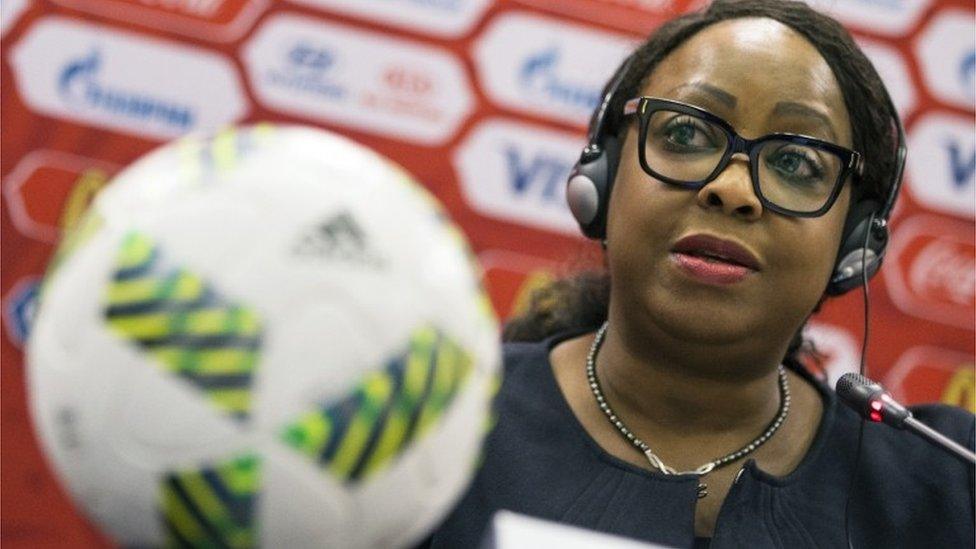
Fifa Secretary General Fatma Samoura has been in her post for three months
The most powerful woman in global football is not the chief executive of a top team, a high-flying financier, or a close advisor of a club-owning oligarch.
Rather she is an administrator who has spent two decades working for the United Nations, and who now - as secretary general of world football body Fifa - has the power to shape the game and its position in society and industry for years to come.
Fatma Samoura is the first woman - and the first non-European - to hold the post in the organisation's 112 year history.
And on Monday she is at the Soccerex convention in Manchester with the dual task of updating the football business community on Fifa's moves to reform itself, and also to present the organisation's first diversity awards.
The Senegalese replaced Jerome Valcke, who was fired and banned from football for 12 years over a ticketing and TV rights scandal.
As a whirlwind of corruption allegations hit Fifa last year, long-time president Sepp Blatter and a number of Executive Committee members were also swept out of the door.
'New era'
Under new Fifa president Gianni Infantino, and Ms Samoura, a fresh start has been promised for a body seen for many years as tainted.
"I am looking forward to speaking with delegates about my thoughts and vision for our game, and the work we have started at Fifa to ensure football enters a new era of greater transparency and good governance," declares Ms Samoura.
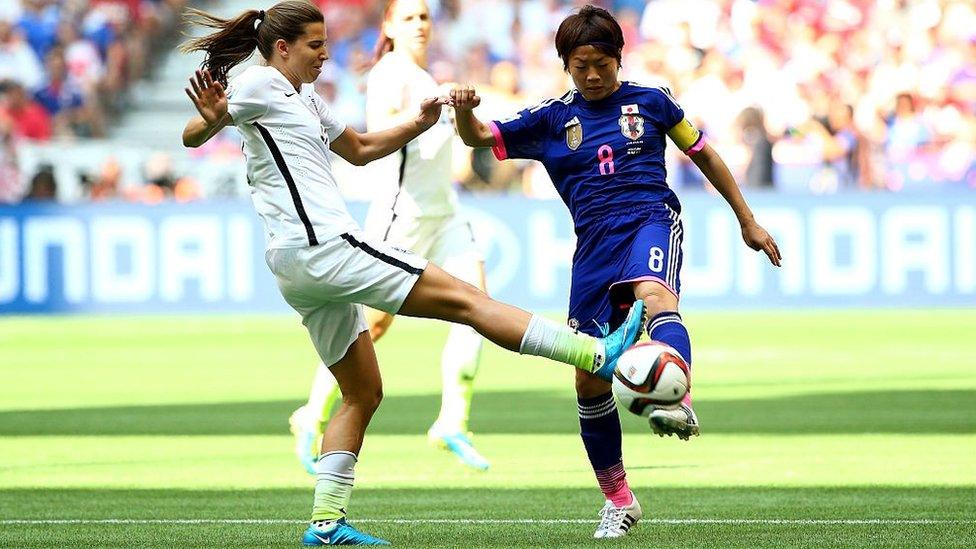
The new Fifa award will recognise diversity in football
"I am also very excited to present... the first Fifa Diversity Award, which will recognise an outstanding organisation, group initiative or personality that is standing up for diversity and anti-discrimination in football."
Ms Samoura was appointed to her post at the Fifa Congress in May and took up her position on 20 June. Her CV is impressive: she speaks French, English, Spanish, and Italian and worked for an industrial chemicals company from 1987 to 1995.
She has a master's degree in English and Spanish from the University of Lyon, and a post-master's degree in international relations from Strasbourg's Business School.
In her most recent post at the UN she was its Resident and Humanitarian Co-ordinator and UNDP Resident Representative in Nigeria.
'Room for improvement'
Such a history means she has a very different background to the stereotypical Fifa administrator or committee member, and is keen to encourage more diversity throughout the sport through the inclusion of women and racial and sexual minorities.
"There is definitely room for improvement in the football industry to become more diverse at all levels," she tells me. "We aim to lead by example - last year we launched a women's leadership programme."
She adds: "Furthermore, in its reforms, Fifa has also introduced regulations and requirements to ensure a more diverse representation at the executive level.
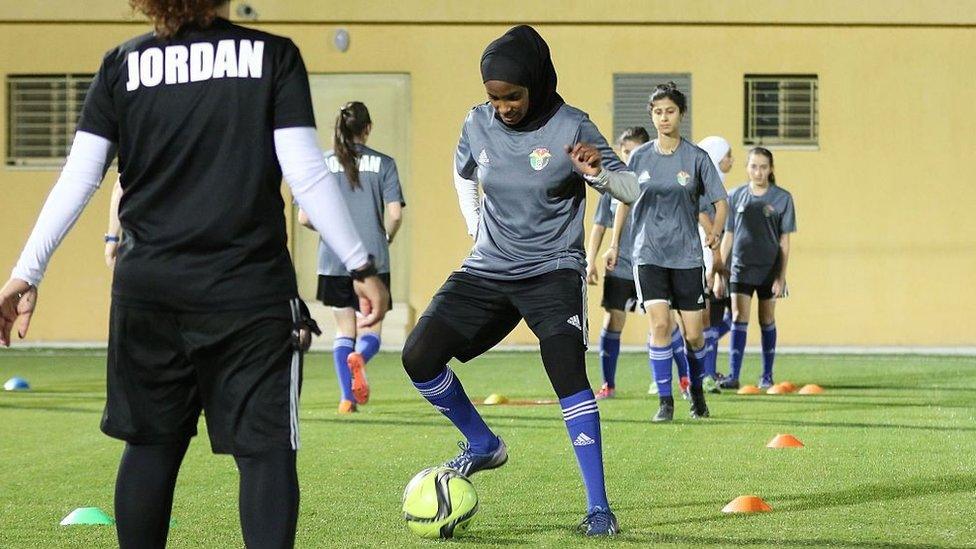
Jordan is the first Middle East country to host an international women's competition
"This includes a minimum of one female representative to be elected as a Fifa Council member per confederation, and also the promotion of women as an explicit statutory objective of Fifa."
She says this equality message is being vigorously passed on to Fifa's 211 member associations.
And on the playing field she says Fifa continues to promote women's football globally, via competitions such as next week's U-17 women's World Cup in Jordan, and also through grassroots programmes and the training of female coaches.
The Jordan competition is the first time a Middle Eastern country will host an international women's football competition.
Social issues
Meanwhile, she says Fifa has "strengthened the monitoring of discrimination incidences for all preliminary matches of the 2018 Fifa World Cup".
And among wider society the 54-year-old says Fifa is engaged in programmes to help tackle social, health and environmental issues.
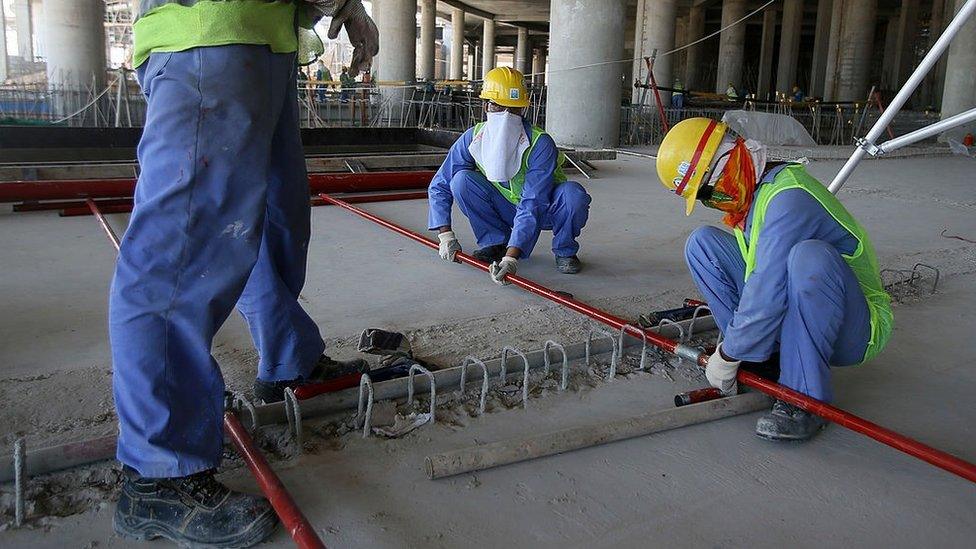
Fifa says it is aware of the situation and risks regarding Qatar working conditions
These include working on HIV/AIDS, conflict resolution, gender equality, social integration, accessibility, waste management, recycling, greener stadiums, climate change and labour rights.
The latter has previously proved a thorny issue for Fifa with regards to the 2022 World Cup in Qatar, after a number of damning reports on conditions for construction workers, including from Amnesty International.
"In regards to the working conditions in Qatar, we are fully aware of the situation and risks," says Ms Samoura.
'Human rights'
She says Fifa has urged Qatar's 2022 Supreme Committee for Delivery and Legacy to ensure fair working conditions on Fifa World Cup sites.
"They developed and implemented a comprehensive standard which meets international norms for working conditions, accommodation and wages," she says.
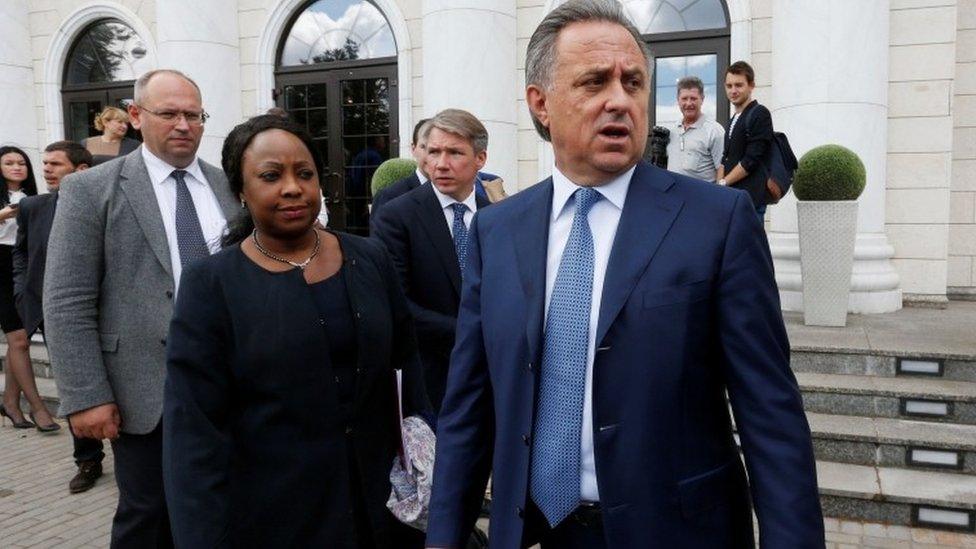
Ms Samoura says Fifa has a monitoring system for labour conditions around Russia 2018
"However, our work on this particular issue goes beyond Qatar. In [2018 WC host] Russia, we are also implementing our own monitoring system for labour conditions which includes quarterly visits of each of the 12 stadiums and a memorandum of understanding with the Building and Wood Workers' International (BWI) union."
In addition, bidding documents for the 2026 Fifa World Cup are being reviewed by experts in regards to human and labour rights.
"We are developing a human rights policy and respect human rights in accordance with the UN guiding principles on business and human rights," she adds.
"I would say, we are already very progressive."
'Multi-faceted strategy
When he announced her appointment, Fifa president Gianni Infantino said Ms Samoura, who is Senegalese, was "a woman with international experience and vision who has worked on some of the most challenging issues of our time".
Now that includes opening up football on and off the pitch.
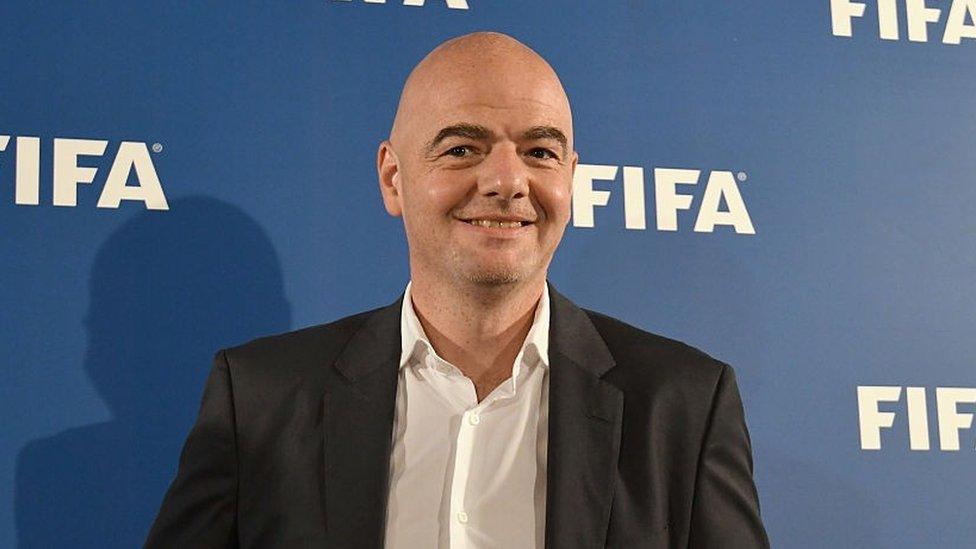
Fifa boss Gianni Infantino has praised Ms Samoura's experience
Looking ahead to Monday's launch, Ms Samoura says the diversity awards will "recognise outstanding organisations, group initiatives and football personalities that are standing up for diversity and inspire unity, solidarity and equality among all people".
She adds: "Those are all activities which are part of our multi-faceted strategy to fight discrimination and promote diversity in football.
"We will continue on this path and believe that our activities will contribute to making the football industry and soccer businesses more inclusive."